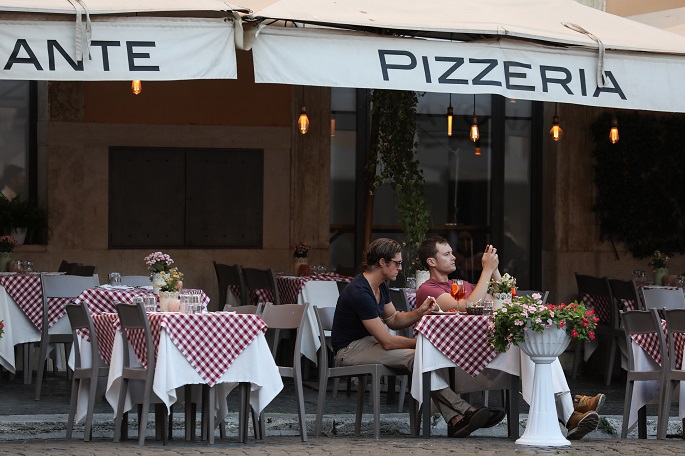Italy marks "Ferragosto" holiday in times of coronavirus
Published : 15 Aug 2020, 23:29
Italians celebrated on Saturday "Ferragosto," a public holiday which falls on Aug. 15 every year, in times of COVID-19, reported Xinhua.
Ferragosto, the Italian name for the holiday, comes from the Latin "Feriae Augusti," and marks the official peak of the summer holiday season when most Italians head to beaches, mountains, or across borders with family and friends. The festival was introduced by the ancient Roman Emperor Augustus over 2,000 years ago.
Because of the COVID-19 pandemic this year, this is the first Ferragosto without the traditional country festivals (called "sagre" in Italian), which celebrate a particular food product, animal, plant, or historic custom, and which are held in villages and small towns throughout the country at this time of year.
The "sagre" have been banned in order to prevent people from crowding together after a recent spike in new coronavirus infections -- some of them linked to young people who got infected after dancing in nightclubs or returning after holidays abroad -- prompted national and regional authorities to crack down on public events.
On Aug. 13, the Health Ministry also imposed mandatory swabs to test for the virus on anyone returning from Croatia, Greece, Malta, and Spain - traditional summer holiday destinations for many Italians.
"Following the reduction in the number of cases of SARS-CoV-2 (the strain of coronavirus that causes COVID-19) infection due to lockdown measures, Italy is in a transitional epidemiological phase, with a progressive worsening trend," the Health Ministry said in its weekly monitoring report, published on Friday.
"This week's report shows a widespread transmission of the virus throughout the national territory," the weekly monitoring report continued.
"This may even cause some outbreaks of significant size, often associated with the import of cases from foreign countries," the report added.
"Overall, the number of new cases of infection remains low, but with an increasing trend," the weekly monitoring report said.
"Young people want to travel and have fun, and rightly so," Interior Minister Luciana Lamorgese said, adding that the nation's prefects will conduct stringent checks in tourist resorts and areas frequented by youth, "many of whom underestimate the risks they are exposing themselves to."
"This is why I call on (young people) to...maintain responsible behaviors," Lamorgese said in a statement ahead of the Ferragosto holiday.
The spike in cases also prompted the government to issue a decree on Aug. 7 extending to Sept. 7 "the minimum precautionary measures to combat and contain the spread of the COVID-19 virus." These include mandatory wearing of face masks in enclosed public spaces, and the obligation to guarantee social distancing during public events both indoors and outdoors.
According to a survey by the National Confederation of Farmers (Coldiretti, in its Italian acronym), 73 percent of respondents said that under normal circumstances, they would have attended a local "sagra" during the Ferragosto holiday.
The banning of the "sagre" affects approximately 34,000 food vendors, the Coldiretti analysis said, adding that "92 percent of typical national (food and wine) products originate in small Italian villages with under 5,000 inhabitants."
In a separate report, Coldiretti noted that health safety concerns have prompted around 400,000 Italian holidaymakers to spend Ferragosto at one of Italy's 24,000 agritourism facilities, however, this number "does not compensate for the absence of foreigners, who accounted for 60 percent of total agritourism guests" in pre-COVID-19 times.
Ferragosto is also the day on which, every year, the Interior Ministry's National Committee for Public Order and Safety holds a meeting and publishes its annual report on national safety and security.
One positive effect of the coronavirus pandemic, according to the report, is that the crime rate has dropped between Aug. 1, 2019, and July 31, 2020, compared to the same period of 2018-2019.
Financial crimes including tax evasion, usury, and fraudulent bankruptcy fell by 23 percent, drug busts by police dropped by 11.7 percent, the number of illegal drugs seized plummeted by 50.1 percent, and international anti-drug operations were down by 57.9 percent, according to the Interior Ministry report.
Violence against women also decreased, with police reports for stalking down by 11 percent in the period, the Interior Ministry said.


